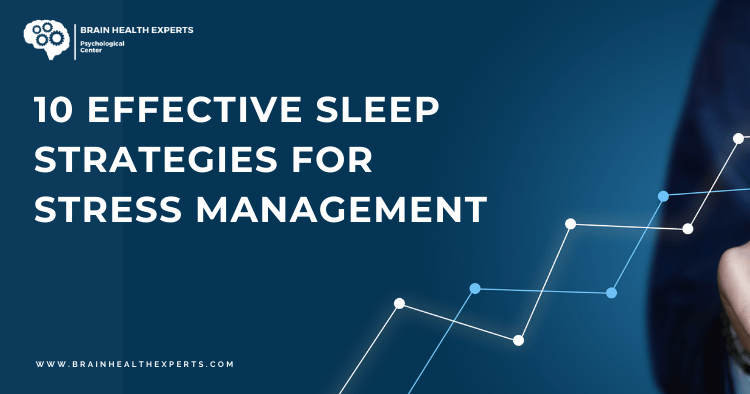Table of Contents
- Understanding the Connection Between Sleep and Stress
- Establish a Sleep Schedule
- Create a Relaxing Bedtime Routine
- Optimize Your Sleep Environment
- Limit Exposure to Screens Before Bed
- Be Mindful of Your Diet
- Incorporate Physical Activity
- Practice Mindfulness and Relaxation Techniques
- Limit Caffeine and Alcohol Intake
- Seek Professional Help When Needed
Understanding the Connection Between Sleep and Stress
Sleep and stress are intricately linked. When we experience stress, our bodies produce hormones like cortisol, which can disrupt our sleep patterns. Conversely, insufficient sleep can heighten our stress levels, creating a vicious cycle. According to the National Sleep Foundation, adults need 7-9 hours of sleep per night for optimal functioning. Understanding this connection is crucial for effective stress management and improved sleep quality.
For more tips on reducing stress, check out 10 Proven Stress Management Techniques for Daily Relief.
Establish a Sleep Schedule
Consistency is key when it comes to sleep. Going to bed and waking up at the same time every day helps regulate your body’s internal clock, leading to better sleep quality. Try to maintain this schedule even on weekends. If you struggle to fall asleep, consider setting a wind-down time to prepare your mind and body for rest.
Tips for Creating a Sleep Schedule:
- Aim for 7-9 hours of sleep.
- Keep your bedtime and wake time consistent.
- Use an alarm to remind you when to start winding down.
Create a Relaxing Bedtime Routine
Establishing a calming pre-sleep routine can signal your body that it’s time to wind down. This routine can include activities like reading, gentle stretching, or taking a warm bath. Avoid stimulating activities that may increase stress, like checking emails or engaging in intense discussions.
For more techniques on fostering a positive mindset, see 10 Powerful Techniques to Cultivate a Positive Mindset.
Suggested Bedtime Routine:
| Activity | Duration |
|---|---|
| Dim the lights | 10 minutes |
| Gentle stretching | 10 minutes |
| Read a book | 20 minutes |
| Listen to calming music | 15 minutes |
Optimize Your Sleep Environment
Your sleep environment plays a significant role in how well you sleep. Make your bedroom a sanctuary for relaxation. Consider factors like:
- Temperature: Keep your room cool, ideally between 60-67°F (15-19°C).
- Darkness: Use blackout curtains to block out light.
- Noise: Consider white noise machines or earplugs to minimize disruptive sounds.
- Comfort: Invest in a good quality mattress and pillows that suit your sleeping style.
Limit Exposure to Screens Before Bed
The blue light emitted from screens—whether from phones, tablets, or TVs—can interfere with the production of melatonin, the hormone that regulates sleep. Aim to put away your devices at least an hour before bed to enhance your sleep quality. Instead, opt for activities that promote relaxation.
For mindfulness practices that can help reduce stress, check out 10 Mindfulness Techniques to Reduce Stress Effectively.
Alternatives to Screen Time:
- Journaling to reflect on your day.
- Engaging in a hobby like knitting or drawing.
- Practicing deep breathing exercises.
Be Mindful of Your Diet
What you consume can significantly impact your sleep quality. Heavy meals, spicy foods, or excessive liquids close to bedtime can lead to discomfort and disrupt sleep.
Foods to Promote Better Sleep:
- Tart cherries: High in melatonin.
- Almonds: Rich in magnesium, which can help relax muscles.
- Herbal teas: Chamomile and valerian root are known for their calming effects.
Incorporate Physical Activity
Regular physical activity can help reduce stress and improve sleep quality. Aim for at least 30 minutes of moderate exercise most days of the week. However, avoid vigorous workouts close to bedtime, as they can be stimulating.
For strategies to boost emotional well-being through physical activity, see 10 Ways Positive Thinking Boosts Emotional Well-Being.
Types of Recommended Activities:
- Walking or jogging
- Yoga or Pilates
- Dancing
Practice Mindfulness and Relaxation Techniques
Mindfulness and relaxation techniques can help reduce stress and prepare your mind for sleep. Consider incorporating practices like meditation, deep breathing, or progressive muscle relaxation into your nightly routine.
For effective mindfulness practices, refer to 10 Mindfulness Practices to Boost Your Resilience Today.
Quick Mindfulness Exercise:
- Find a quiet space and sit comfortably.
- Close your eyes and take deep breaths.
- Focus on your breath and let go of any distracting thoughts.
- Continue for 5-10 minutes.
Limit Caffeine and Alcohol Intake
Caffeine can stay in your system for hours and may disrupt your sleep if consumed too close to bedtime. It’s best to limit caffeine intake, especially in the afternoon and evening. Similarly, while alcohol may initially make you feel sleepy, it can disrupt your sleep cycle later in the night.
Recommendations:
- Limit caffeine intake to the morning hours.
- If you choose to drink alcohol, do so in moderation and avoid it close to bedtime.
Seek Professional Help When Needed
If you’ve tried these strategies and still struggle with sleep or high stress levels, it may be time to seek professional help. A healthcare provider can assess your situation and suggest appropriate treatments, ranging from therapy to medication.
When to Consult a Professional:
- Persistent insomnia lasting more than a month.
- Severe anxiety or stress impacting daily life.
- A sleep disorder diagnosis.
By incorporating these sleep strategies into your routine, you can effectively manage stress and improve your overall well-being. Remember, quality sleep is not just a luxury; it’s essential for a balanced, healthy life.
For further reading, consider visiting the American Psychological Association and the Centers for Disease Control and Prevention for more resources on sleep health and stress management. Sweet dreams!





